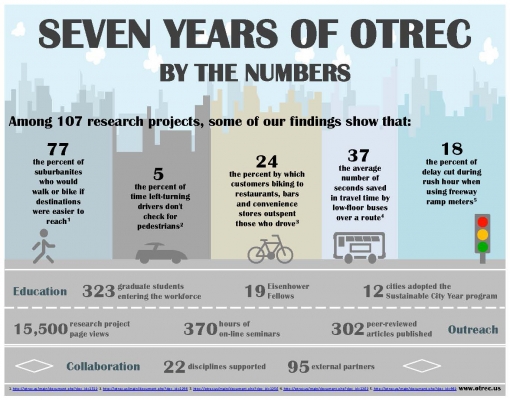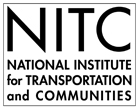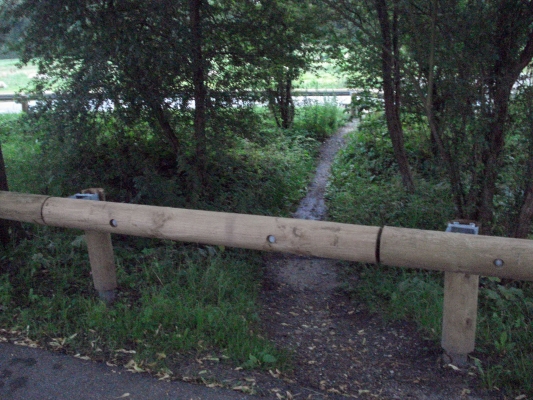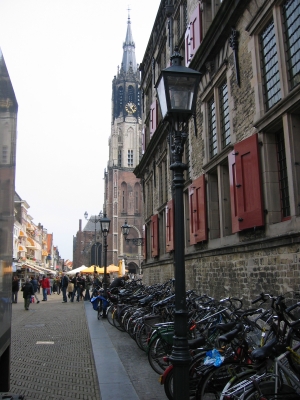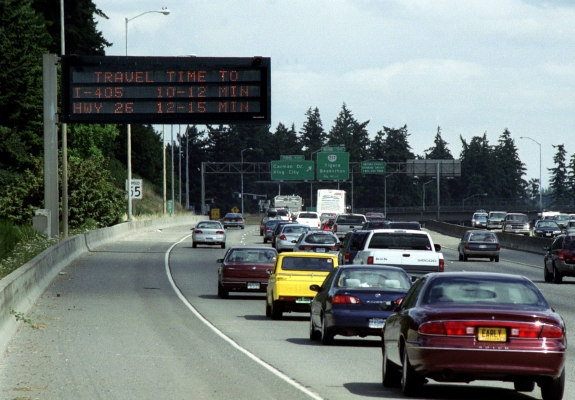As we prepare for the next step in our development as a center, we're taking a look back at the seven years since OTREC's founding:
The Oregon Transportation Research and Education Consortium, or OTREC, was founded in 2006 with a theme that emphasized advanced technology, the integration of transportation and land use, and healthy communities. OTREC’s mission is to inform transportation decision making through timely, useful primary research and to build the capacity of the transportation workforce.
Reflecting the DOT mission, OTREC promotes choices that make our transportation system safe, resilient and adaptable. Providing access to travel options that promote the health of our communities and our environment makes our country stronger.
From the research that makes our communities living laboratories to the innovative education and technology transfer efforts that wed research and practice, our programs lay the groundwork for livable communities. Our advanced technology projects have shown the effect of traffic-signal timing on pedestrians’ exposure to pollution and helped a state Department of Transportation place sensors to best estimate travel times for the least cost. Our healthy communities projects...
Read moreThe NITC program's executive committee has selected a new roster of projects for funding under the National Institute for Transportation and Communities, or NITC, program. The committee chose 10 projects, totaling $900,000, under the NITC theme of safe, healthy and sustainable transportation to foster livable communities.
The projects are national in scope and reflect priority areas including transit supply and outcomes, and pedestrian and bicyclist behavior.
Projects selected include:
- A bicycle and pedestrian miles traveled project for Washington state.
- A study that measures the effectiveness on social media on advancing public transit.
- A look into crowdsourcing the collection of data on transportation behavior.
- A national study of Bus Rapid Transit outcomes.
A complete list of projects and principal investigators is below:
- National Study of BRT Development Outcomes: Arthur Nelson and Joanna Ganning, University of Utah
- Crowdsourcing the Collection of Transportation...
The National Institute for Transportation and Communities (NITC) program invites proposals for the 2014 Doctoral Dissertation Research Fellowships. Fellowships up to $15,000 will be awarded to cover expenses for the recipient while working on their dissertation. NITC is focused on contributing to transportation projects that support innovations in: livability, incorporating safety and environmental sustainability
ELIGIBILITY
Students must be U.S. citizens and have advanced to candidacy for the Ph.D. degree prior to the application deadline. NITC fellowships are open to students currently enrolled in a transportation-related doctoral program at Portland State University (PSU), University of Oregon (UO), Oregon Institute of Technology (Oregon Tech) or the University of Utah (UU).
PROCESS
Applicants must submit one electronic copy (in PDF) of their proposal to Susan Peithman (peithman@pdx.edu) by January 31st, 2014. More information can be found by downloading the application here: NITC Dissertation Application.
ABOUT
This grant is part of the University Transportation Center (UTC) program funded by the U.S. Department of Transportation’s Research and Innovative Technology Administration. The mission of the UTC program is to advance U.S. technology and expertise in the many disciplines comprising transportation through...
Read moreThe National Institute for Transportation and Communities (NITC) is pleased to issue its first pooled-fund request for proposal to develop an online non-motorized traffic data archive. Making non-motorized count data accessible online with visualization tools that are useful to both researchers and practitioners can address two needs: first, to improve the practice of planning and designing for non-motorized transportation activity; and, second, to expand the ability of transportation professionals to share rigorous and quantitative metrics associated with bicycling and walking.
The project budget is $175,000 with research completed within a time period of 19 months. Interested teams do not need to provide match. Proposers interested in submitting proposals must email Hau Hagedorn (hagedorn@pdx.edu) with their intent to submit a proposal by December 16, 2013. The email should include name(s) and contact information of investigators including university affiliation. Full proposals are due January 31, 2014. For more information, go to: https://trec.pdx.edu/OTRECUS/for_researchers/rfp
ELIGIBILITY
Faculty members and research faculty eligible to serve as Principal Investigators (PIs) at Portland State University, the University of Oregon, the Oregon Institute of Technology, or the University of...
Read moreOTREC hosted a “welcome to the neighborhood” reception last week for managers of TriMet.
The regional transit provider for Portland, Ore, just relocated its offices to a building near the OTREC headquarters. TriMet's arrival in Harrison Square, just a few blocks from PSU in downtown Portland, was toasted by an informal gathering: TriMet executives were invited to the OTREC offices Tuesday, Oct 29 for a meet-and-greet.
The two agencies are both deeply involved with transportation in the Portland region, and since they're going to be neighbors now too, OTREC's education and technology transfer program manager Jon Makler arranged the event.
Several members of TriMet's senior staff joined OTREC staff and researchers for an hour of refreshments, research briefings, and a few rounds of "Transit Route Bingo."
OTREC Director Jennifer Dill and TriMet's Olivia Clark, head of government relations, kicked off the meeting with some welcoming remarks, then Makler gave the TriMet managers a brief powerpoint presentation, explaining the various overlapping areas of transportation at PSU. He introduced them to OTREC, IBPI, and PORTAL, and the role each group plays.
The presentation also featured a slide for each faculty researcher, explaining their areas of special...
Read moreNohad Toulan’s influence on Portland State University and the wider community can be seen not only in the school bearing his name, the Nohad A. Toulan School of Urban Studies and Planning, but also in the holistic approach to transportation research and education that would help cement Portland’s innovative reputation and shape its transportation center, OTREC.
Toulan, emertitus dean of the College of Urban and Public Affairs, and his wife, Dirce, both died Monday. He was 81 and she was 78.
Toulan helped pave the way for the creation of OTREC by stressing the value of human development, said Robert Bertini, OTREC’s founding director. “Our focus on emphasizing people, on building and encouraging the development of faculty, students and collaborators outside the university, that was directly influenced by the atmosphere created by Dean Toulan,” Bertini said.
Portland State’s Urban Plaza embodies Toulan’s vision of an urban university connected with its city. There, the college’s lessons spill out into a vibrant plaza interwoven with transit and the life of Portland.
OTREC’s—and Portland State’s—reputation for multidisciplinary, collaborative transportation research grew thanks in part to Toulan’s efforts. Toulan extended Bertini, an engineering professor, a joint appointment the College of Urban and Public Affairs. “He said, ‘I need an engineer in my college,’” Bertini...
Most people in transportation circles have heard all about the Netherlands as a bicyclist’s mecca, a place where thirty-five percent of the population regularly commutes by bike. What may be less commonly known is how recent this achievement is.
In 1967, bicycling in the Netherlands was “tantamount to attempting suicide,” according to Amsterdam’s chief inspector of traffic police.
Today, the Netherlands is the safest place in the world to operate a bicycle, based on injury and fatality rates per miles traveled. In less than fifty years, their bicycle safety rates have soared and the Dutch have built a bicycle infrastructure that is the envy of the rest of the world. How did they do it?
Could Americans possibly do the same?
That’s what Portland State University transportation students aim to find out.
When PSU student Kirk Paulsen signed up to spend two weeks in the Netherlands as part of the first PSU civil engineering study abroad program, he wasn’t sure what exactly he might get out of it, but knew that he wanted to see famed Dutch bicycling facilities for himself. Paulsen was one of seven transportation students in the pilot class of 2011, and now has this to say about the experience:
“This short study abroad course is by far your best opportunity while enrolled at PSU to observe real world...
Read more

